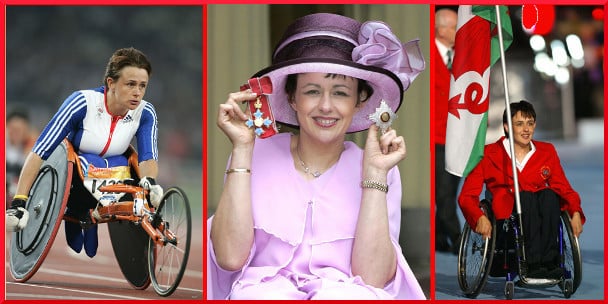
It would be wrong to say that anti-obesity experts ignore the psychological side of things, but as Dr. Pretlow has observed, they seem interested mainly in treating the psychological effects of being obese, rather than the causes. Others have also noticed this. In the United Kingdom, where child obesity is still an hotly-debated national issue, the country’s eminent and influential chef has been criticized for that exact reason.
“Jamie Oliver is wrong.” To Oliver’s large contingent of admirers, those are fighting words. They were said by Tanni Grey-Thompson, a member of the House of Lords who holds the honorary title of Baroness. Born with spina bifida and wheelchair-bound since age seven, as a teen she practiced her wheelchair racing skills in multi-level parking garages. She became a Paralympian contender and, over the course of her sports career, won 11 gold medals.
Among other attainments, Grey-Thompson has published two books, Aim High and Seize the Day, and from the titles alone it is easy to see where this lady’s head is at. She is a motivational speaker, and the list of her honorary degrees and doctorates takes up half a page.
So why does this very accomplished public figure badmouth Oliver? Because he was a member of a coalition that has called upon the government to implement a “comprehensive strategy” to beat childhood obesity, about which she says:
It included 13 recommendations, but there were two glaring omissions from the list: the role of physical activity, and improving mental health and wellbeing — a decision I find deeply disheartening in a “comprehensive” strategy.
The emphasis on diet downplays equally important matters, and ignores the fact that obesity is a complex, multifactorial condition. In Grey-Thompson’s view, nutrition, physical activity, and mental health are comparable to the church’s Holy Trinity. Or to put it in more mundane terms, they are the three equally important legs of the tripod on which health is supported.
Exercise as a preventative
Grey-Thompson does not advocate for compulsory psychological exams or anything so extreme. Rather, she seems to be advancing the idea that with greater encouragement of sports, with more opportunities for physical activity, and more widespread participation in it, mental health is automatically affected, and cannot help but improve. It is easy to see how a lifelong athlete who has also accomplished so much in other areas would come to that conclusion — it is her personal, lived experience.
It is, moreover, the national experience of Great Britain. Regardless of anyone’s feelings about imperialism, the fact is indisputable that England once ruled pretty much the entire planet. Its native sons and daughters grew up with such slogans as “The battle of Waterloo was won on the playing fields of Eton.” Children who excelled in sport grew up with a world-beating attitude, and child obesity was rare.
A piece in the Ealing Times delves into Grey-Thompson’s thoughts on the matter:
The 11-time Paralympic champion believes by raising the curtain on the pressures of competing at elite level, athletes will empower people who do not work in sport to examine their own struggles with mental health.
“It’s never-ending, it’s a conveyor belt,” she said. “It’s all about targets and times, you need to do certain things to get on the team, and then even if you win medals, you start at ground zero again at the next cycle.”
Those words were said at a forum for a campaign “aimed at using sport as a means of tackling the stigma surrounding mental health.” The parallels are easy to see. To keep a healthy, normal-weight body is an ongoing challenge that requires a mindful lifestyle. Things cannot be just left to random forces. The conveyor belt of endless days presents opportunity after opportunity to live up to an ideal.
Even if someone “wins the medal” by achieving the perfect target weight, that physique will not maintain itself. It needs constant attention, awareness, and encouragement from the mind. In turn, the rewards of maintaining a healthy weight also feed the person’s emotional needs, and indirectly but unassailably contribute to increasing levels of mental wellness and thus physical well-being. Childhood Obesity News readers will remember Dr. Colin Higgs, who enumerated 15 benefits of exercise, of which is “promote healthy weight” is only one.
Your responses and feedback are welcome!
Source: “Jamie Oliver is wrong — obesity is not just about diet,” TheGuardian.com, 04/30/18
Source: “Tanni Grey-Thompson urges athletes to share their mental health struggles to help reduce stigma,” EalingTimes.co.uk, 10/23/17
Image by BBC

 FAQs and Media Requests:
FAQs and Media Requests: 











